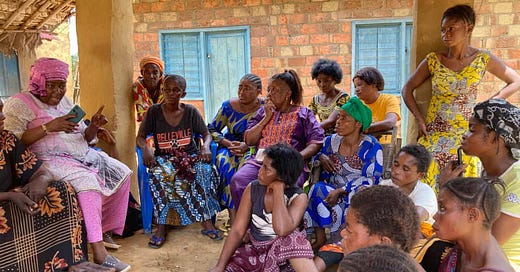Global Roundup: DRC Network of Women in Mining, Punjabi Women’s Distress Helpline, Lebanese Women’s Handcrafted Goods, Black Trans Excellence in Theater, Gazan Woman’s Knitwear
Curated by FG Contributor Inaara Merani
Annie Sinanduku Mwange speaks at a meeting in Kailo, taking another step in her fight for women’s empowerment in the artisanal mining sector. (The Guardian)
In the small mining town of Kailo, in the Democratic Republic of Congo (DRC), Annie Sinanduku Mwange is revolutionizing the artisanal mining sector for women with the support of a nationwide network of women, to ensure their rights are respected.
As president of the National Network of Women in Mining (Renafem), Mwange has worked for years to build a movement that fights for the rights of women in mining, a sector that millions of individuals in the DRC depend on for their livelihood. She first created Asefa, a civil society organization that piloted an education and training programme that helped shift gender dynamics and also improved health and security around mines for women in Kailo.
Every single programme and effort to reform the artisanal mining sector has focused on men. Women are systematically underestimated and ignored, including by international organizations. We think women’s empowerment is the key to changing the sector and ensuring it benefits local communities. – Annie Sinanduku Mwange
Although women working in the mines in the DRC is not uncommon, many women lack the physical strength to produce significant quantities of minerals such as cassiterite, coltan, or tantalum. Consequentially, women have been pushed towards peripheral jobs in the mining sector such as transporting and washing the mineral sand, which essentially makes women dependent on male miners for work and payment. In light of this, one of the most transformative concepts that Mwange and her organization are popularizing is the mère boss, or the “mother boss”.
Now, I am a mère boss…If women have to ask men for the mineral sand, they are liable to be sexually exploited. But if I own a mining put and employ the men, now I am their boss. They can’t tell me “macula” [undress] because they depend on me. – Bertha Bangala, miner
Many women in Kailo took out loans from neighbours and family members to start their businesses, and now 56 of these women are mères bosses, and around 250 women have become mères bosses across eastern DRC. Currently, women make up 50 percent of the 2 million-person artisanal mining industry, and are often the primary earners of their households, in charge of children’s education, the family’s health, and wellbeing, yet their rights are still vastly underrepresented in mining. Mwange’s plan to support the growth of mères bosses will improve women’s livelihoods and support society as a whole.
When communities take ownership, you don’t need to put in a lot of effort. People feel seen, and they want to show you what they are capable of. – Annie Sinanduku Mwange
Courtesy of Sunder Singh
Attempting to address the challenges faced by Punjabi youth, and women and girls in Canada, a distress helpline was launched by Sunder Singh, founder of the Elspeth Hayworth Centre for Women in Canada. The distress helpline is part of a broader strategy to increase awareness campaigns targeting Punjabi women.
The Elspeth Hayworth Centre for Women (EHCW) is an organization in Toronto, Canada that strives to empower “immigrant and newcomer women, seniors and families, mainly of South Asian origin, to enjoy all rights and benefits of living in Canada through services focused on promoting healthy families, community relationships, and economic self-sufficiency.”
The helpline is designed to address a spectrum of concerns such as emotional distress, employment challenges, financial difficulties, and protection from criminal activities. It seeks to create a safe space where individuals can seek assistance without fear of judgement. In addition to the distress helpline, Singh also announced a national hotline, which will provide comprehensive support at a broader level.
Parents in India are not sensitive towards the hardships the youngsters face in Canada. Punjabi daughters should share their struggles with organizations like ours for effective solutions. – Sunder Singh
All in all, the distress helpline is a platform which aims to provide support and empowerment for Punjabi youth, women and girls in Toronto, and across the country. Singh's dedication to providing this assistance shows a willingness to foster inclusivity and understanding within the Punjabi community and Canadian society at large.
Puck empowers Lebanon’s female entrepreneurs with launch of ‘Selfless Shelves’ initiative. (PR Newswire)
A new initiative launched by Puck, the global brand owned by multinational dairy company Arla Foods, will empower five entrepreneurial women from five villages in Lebanon. The initiative, "Selfless Shelves", will grant the five women entrepreneurs shelf space in Carrefour stores to sell their handcrafted, locally-sourced produce, known as 'mouneh’, packed and repurposed in Puck glass jars.
The handcrafted products, which entered select Carrefour stores in Lebanon just two days ago, include makdous eggplant, za'atar dried orange bitter peels, sumac, and pumpkin jam. Each glass jar is meant to highlight each woman’s story, as well as support their families financially.
It is inspiring to see Puck take steps through ongoing campaigns to encourage mindful habits by reusing its glass jars whilst also supporting and empowering Lebanon’s women-led local artisanal businesses. – Yahia Adel Z AlSharif, Head of Category at Arla Foods
Puck chose to launch this initiative in light of the economic crisis in Lebanon, which has left 63 percent of women unemployed. In remote villages across Lebanon, job opportunities have reached an all-time low, and women typically resort to selling mouneh as a means of earning a basic income.
Photo by Hakeem Adewumi. (Them)
Giselle Byrd, a 31-year-old Black trans woman, made history as the first Black trans woman to lead a major American Theater company when was appointed as the executive director of the Theater Offensive (TTO), one of the oldest and most decorated queer hubs of performing arts in the US.
I think about all of our ancestors and our transcestors who didn’t get to have their voices amplified, or even heard — how they fought for me to get to this moment. I hope that people see that trans women of color are so capable; we’re so capable of leading your companies, of leading the arts in general. – Giselle Byrd
Long before she stepped into this role, Byrd was the president of Third Act, a student Theater organization at the Savannah College of Art and Design. While she was president, the organization planned a charity drag show to support Broadway Cares and Equity Fight AIDS. Byrd had the opportunity to get glammed up at their local Mac makeup counter, which she says is the first time she really saw herself.
That same summer, she got a job in talent management at Katz Company in New York, and realized that she was hiding her truth as a trans woman, making it hard to navigate helping other artists with their vision. After transitioning and finding truth in her lifestyle, and after nine years of managing the careers of authors and actors at the Katz Company, Byrd is assuming leadership of the TTO.
Founded in Boston in 1989 by playwright Abe Rebecca, the TTO was created to represent the manifold realities of queer life, while seeding the next generation of queer and trans theater-makers. The TTO is also home to the country’s longest-running LGBTQ+ youth theater program, True Colors: Out Youth Theater, as well as a number of other workshops, residencies, and commissions for queer and trans artists of colour. In the upcoming year under Byrd’s guidance, the TTO is set to roll out more programming, as well as learning and experiential opportunities for young queer and trans artists in the US.
A lot of people have spoken about how we’ve got to take care of the youth. The youth are going to take care of us. We’ve got to make sure that we leave the light on for them, and that’s what we’re doing in this new wave at TTO. – Giselle Byrd
Shehnaz Shafiq Ali Bakr, 64, is dedicating her time and effort to knitting blouses, winter caps, and socks for free for children in Gaza. As Israel’s genocide looms on with no clear end in sight, 2 million people in Gaza are suffering through the cold and harsh conditions of winter with no electricity, food, water, shelter, or any of their personal belongings. Most individuals are now displaced, with the majority of Palestinians crowding towards the south of the Gaza Strip, as Israeli forces have repeatedly carried out bombing campaigns and forcibly displaced virtually everyone in Gaza.
Without access to proper shelter, warm clothing, food, electricity, the winter has become an extremely difficult time for everyone living in Gaza.
Here I am, working under the bombing for the kids, knitting for them to shield them from this cold frigid weather. – Shehnaz Shafiq Ali Bakr
Although she was displaced from Gaza to Rafah, Shehnaz took all her knitting supplies with her and has been working tirelessly to ensure young children, as well as other Palestinians, are staying warm during the winter. While she usually finds difficulty unravelling all the yarn by herself, Shehnaz has employed assistance of her granddaughter who prepares the unravelled yarn for her grandmother to use skillfully.
Shehnaz says that her dream is to visit the Al-Aqsa mosque and to pray in its courtyards. She also wishes for the occupation to end, and for a free Palestine.
Inaara Merani (she/her) recently completed her Masters degree at the University of Western Ontario, studying Gender, Sexuality, and Women’s Studies with a specialization in Transitional Justice. In the upcoming years, she hopes to attend law school, focusing her career in human rights law.
Inaara is deeply passionate about dismantling patriarchal institutions to ensure women and other marginalized populations have safe and equal access to their rights. She believes in the power of knowledge and learning from others, and hopes to continue to learn from others throughout her career.








